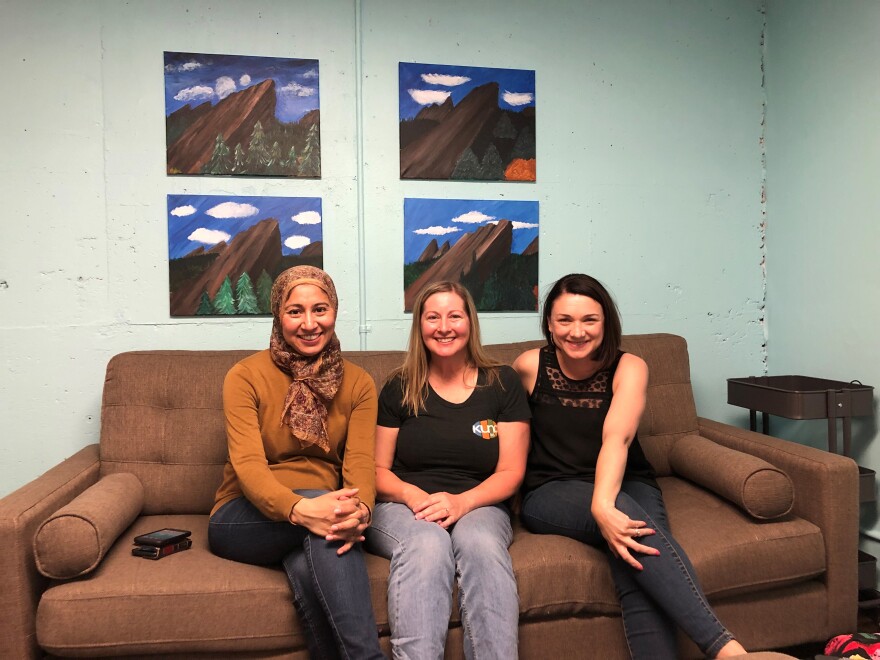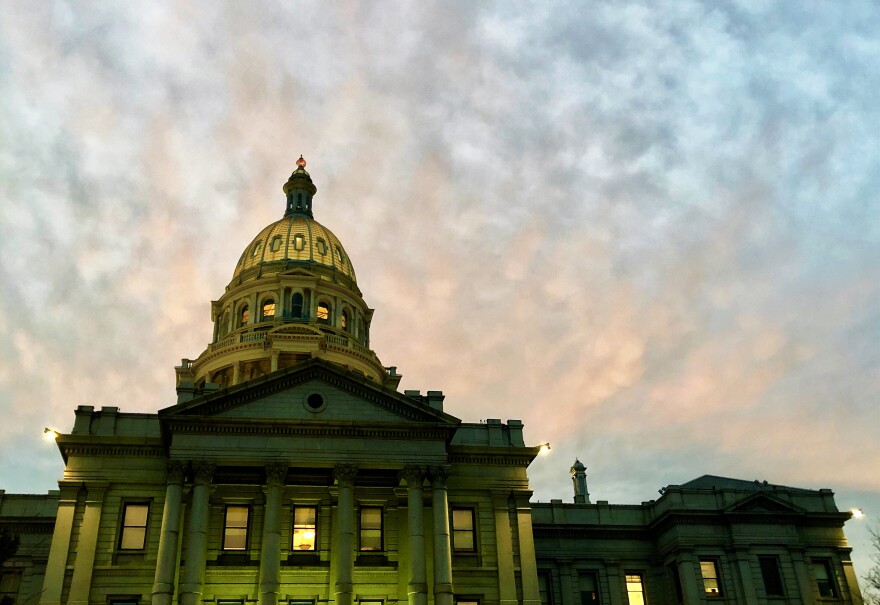On Friday, NPR Politics hosted a live taping in Boulder called “The Road to 2020,” and while the team was in town, Colorado Edition sat down to talk with them.
Colorado Edition co-host Erin O’Toole spoke with Tamara Keith, White House correspondent for NPR and co-host of the NPR Politics podcast, and Asma Khalid, political correspondent covering the 2020 presidential campaign for NPR and co-host of the NPR Politics Podcast, about the 2020 presidential race and what they are watching in Colorado politics.
Interview Highlights:
These interview highlights have been lightly edited for length and clarity.
Erin O’Toole: I know you’ve been following the Colorado senate race for Cory Gardner’s seat. What stands out to you about this race?
Tamara Keith: Well, this is probably the hottest senate race in the country in this cycle. This is the one that Democrats want the most, and where they feel like they have a really good shot. And obviously Republicans and Cory Gardner think that they have a path, but he won in 2014 which was a really terrible year for Democrats.
It was a mid-term year in the Obama administration — most of the Democrats who were facing tough races that year lost. And Cory Gardner was one of the candidates who won, and so now six years later it's a different year. It's not a mid-term, it's a presidential year and the dynamics are very different than they were when he and a lot of these other senators were first elected.

And we've been hearing this is considered one of the most vulnerable senate seats in the nation, is that what you're hearing?
Keith: Absolutely. And if you look at the Cook Political Report and their rankings, this is one of those seats, along with Maine ... where it's considered potentially vulnerable. But if you look at this state in 2016, President Trump fared worse than any Republican, as a percentage of the electorate that he won. He fared worse than any Republican since George H.W. Bush. And as a result, there is some question about whether — and Republicans will argue, no, Colorado is a purple state — but there is some question of how purple that hue really is, and this senate race is going to be a really good test of that.
Asma Khalid: And this is probably no news flash to you or your listeners, but I cover demographics, and the demographics of Colorado are part of this, and a major part is the fact that there are a number of college-educated voters who have moved to this state, non-native Coloradoans who have changed the demographic make-up of this state, who tend to lean more liberal, tend to vote more for the Democratic party.
What are you going to be watching for in the Colorado senate race as it moves forward?
Khalid: John Hickenlooper is really seen as the front runner. He has a lot of name recognition in the state, and by him entering the race, to me it did sort of change the dynamic of what many folks had maybe seen to be as a potentially more open seat on the Democratic side. I think one of the interesting questions always when there is somebody who is deemed to be a front runner is how resilient they are.
Keith: I have a couple of questions about this race. One is John Hickenlooper didn't want to run for senate, at least that's what he said repeatedly and publicly on camera. And I do wonder how much of a problem that is going to be for him, assuming he does get the nomination. The other question is how much of a fight is it for him to get the nomination — he does have this name ID, but he hasn't fully cleared the field.
And with Gardner, I guess what I'm watching for is, are there any moments when he separates himself for President Trump, or not. He ran initially as this "I'm going to be a moderate, I'm going to go to Washington, I'm going to work with Democrats we're going to get things done." He has, his campaign would tout his bi-partisan voting record, Democrats would say it's not bi-partisan, he votes with Trump all the time. Is there a path for a Republican who puts themselves at arm's distance from President Trump? Is there a path for a Republican in a purple state? I don't know.
And we were talking about Colorado being a purple state for a long time. It does seem like it's changing — are you seeing shifts like this in other states?
Khalid: Very much so. The map is totally changing. I think that's one of the most exciting things about having covered the 2016 cycle to now. I would argue the entire path to victory for a Republican candidate or a Democratic candidate has fundamentally changed. For a long time, Democrats would talk about a blue wall in the Midwest, and that would be the traditional "Rust Belt" states: Pennsylvania, Michigan, Wisconsin, and even to some degree Ohio.
Ohio has been trending more and more Republican. Those states are states that Donald Trump won in 2016, and the Democrats do see they need to make in-roads in. But Donald Trump also sees those states tilting more in his favor, more than a Republican 20 years ago would have.
On the flip side, there are states all around the "Sun Belt," and I would include Colorado in that category: North Carolina, Colorado, Arizona, Nevada, Florida-ish. These are states that are demographically trending more towards the Democratic party. And what I mean by that is you have a larger percentage of non-white voters in those states, and you have a higher percentage of white college-educated voters, and those two groups in particular have seemed to be tilting further away from President Trump.
Asma, in 2016 you produced a reporter's notebook about it was like to be out there and talking to voters and covering the 2016 presidential campaign and experiencing racism. And I'm just curious how your experience has been during this campaign cycle.
Khalid: So this campaign cycle so far has been fundamentally different. In part because I'm covering Democrats this election cycle and the Democratic electorate is much more diverse than the Republican electorate. And so when you're at campaign events, there are many different races already there, and so you don't stick out like a sore thumb in the way I did at Trump rallies. It was very obvious who I was.
But I think that it's a totally different experience, but look, I think part of what that tells me, is that — and I guess if I think about it too much, I think it's really problematic — because what that actually speaks to is how fundamentally racially polarized the electorate is. That I can exist in certain spaces as a total non-issue, nobody even pays attention really to the fact that you're there, whereas in other spaces it's very apparent that you're there. And to me that speaks to really big broader political issues, but also civic issues about a country that really racially is extremely politically segregated at this point.
Keith: There is definite political racial segregation. Covering Republicans, I would go days without seeing a person of color. If you're in the bubble with a Republican campaign, you can go a very long time without seeing a person of color and it feels weird. You'll be in states and places where you know that it is diverse, and yet because you're in the campaign bubble you're in a place that is so incredibly white and it feels just so strange.
Khalid: And that's so remarkable to me, because that's also — for citizenship and civic duty it's problematic. You're in a country where we talk about, we have young kids and our kids are growing up in a world where to be white is to be a minority, and at this point our politics don't embrace what our kids' worlds look like.
Keith: But there's also — and this relates to demographics too — there's this growing rural-urban divide in our politics, that play out in Colorado politics as well. We're in Boulder right now, you go to Denver, and it's as blue as can be, and you would never know there are Republicans in this state, but there are. And they're in the more rural parts.
Tamara Keith is a White House correspondent for NPR. And Asma Khalid is a political correspondent covering the 2020 presidential campaign for NPR. They are both co-hosts of the NPR Politics Podcast, which you can find wherever you get your podcasts.






